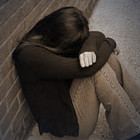
Therapists Urge Seeking Help Immediately After Suicidal Thoughts
|
The best time to seek help for anyone who finds themselves contemplating suicide is now, according to mental health professionals.
Juvenile Justice Information Exchange (https://jjie.org/tag/suicide/page/2/)

The best time to seek help for anyone who finds themselves contemplating suicide is now, according to mental health professionals.

Gun violence touches every community, but those most affected are also disproportionately exposed to poverty, poor education standards and fewer job opportunities. Firearm violence is also defined by startling racial and ethnic disparities. It is no wonder that the national sentiment has become one of frustration, a growing conviction that enough is enough.

This story is part of a series on public health and firearms. The first examined groups working to reduce homicide in Birmingham. The second interviewed Birmingham Mayor Randall Woodfin about his office’s peace initiative. The third examined a proposed voluntary “do not sell” list for Alabamians suffering mental illness, which aims to prevent firearm access for people with suicidal ideation.

When a person commits suicide, family members are often left wondering how they could have saved their loved one’s life.

Paul Reviere is sheriff of Lincoln County, a rural area with just under 8,000 people two hours east of Atlanta. In addition to maintaining safety, he gives what he calls “50-cent tours” to out-of-towners, showing off downtown Lincolnton.

Teenagers confined to two state-run South Arkansas juvenile lockup frequently were not adequately supervised, according to nine current and former staffers...
In Michigan, 17-year-olds are not allowed to buy lottery tickets, get a tattoo, rent a car or hotel room or drop out of school. They can’t vote, serve on a jury or sign a legal contract either, presumably because they don’t possess the requisite maturity to make adult-level decisions. This distinction, however, is tossed out the window if a 17-year-old breaks the law. Suddenly, they are adults, facing devastating repercussions that can come with an adult conviction.

My young parents didn’t have the skill sets to properly raise me, which at a young age caused me to search for acceptance in other places. I began running away at the age of 13 and quickly got heavily involved in drug use.

A nationwide shift toward abolishing solitary confinement for juveniles, which began to take shape in 2016 after former President Barack Obama banned the...

The family of 19-year-old Ashley Smith says guards watched and did nothing as the young woman strangled herself to death in an Ontario prison cell. Smith spent her teen years in and out of juvenile custody and, once in the adult system, had her mental illness answered by physical abuse, her family alleges in a legal battle to find out more about their daughter’s death. For youth incarcerated in the United States, the mental care they get — or don’t — varies. “In some places, all of this is really done quite well,” said Preston Elrod, a professor in the Department of Criminal Justice at Eastern Kentucky University and a juvenile justice specialist. “But in other places, none of it is done well.”
About 70 percent of young people who come into an institution have a diagnosable mental health disorder or symptoms of one, according to Gina Vincent, a psychiatry professor from the University of Massachusetts Medical School, in a 2012 report about screening and assessment in juvenile justice systems.
Rules vary by state, though in many places, children will not stay in the juvenile detention system, receiving what juvenile-tailored services exist, as long as Smith did: her 18th birthday.